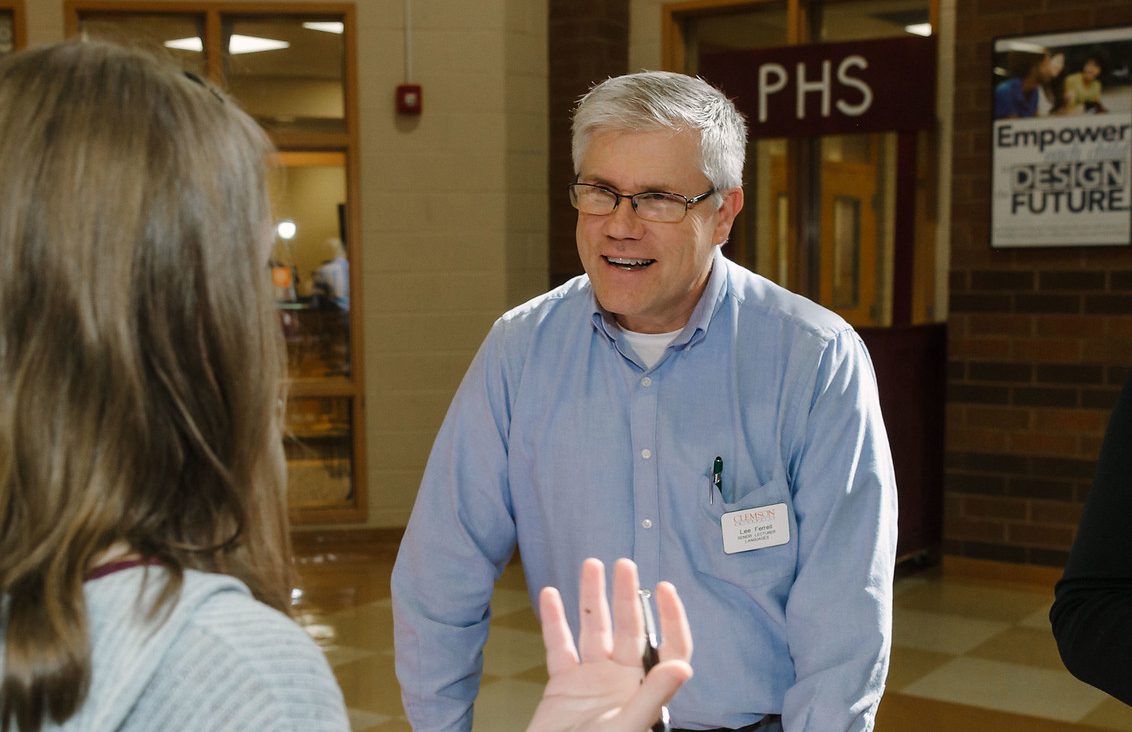
Studying a language offers a world of opportunities.
That was the message of Clemson University Language Day, a program presented Oct. 17 at Pelion High School by students, faculty and staff from the College of Architecture, Arts and Humanities.
That morning, the school cafeteria was buzzing with enthusiasm as about 220 teenagers from five schools interacted with their visitors from Clemson, using not only English but also Spanish, French, German, Italian, Japanese and Chinese.
“This outreach opportunity stresses the importance of languages in a global economy and connects high school students to the great programs we offer,” said Lee Ferrell, a member of the German faculty at Clemson University and the event’s organizer.
“Our goal is to show how accessible Clemson can be,” said Julia Harvey, who helped organize the day as the Department of Languages’ student services coordinator. “I fully expect many of these students to visit the campus. Hopefully, they will be future Clemson students.”
Almost two dozen Clemson representatives were on hand, including instructors José Ortiz, Ling Rao, Kumiko Saito and Kenneth Widgren, and current students who fielded one-on-one questions from their younger peers.
Ferrell wants younger students to understand that learning a language can be more than just something to put on college applications. And he hopes the juniors and seniors will grasp the value of majoring or minoring in a language in college, and especially the value of doing so at Clemson University.
Sara Norton, a senior at Lexington High School, is planning to do just that. She intends to double major in Spanish and environmental studies at Clemson. “Something that really inspired me to make that combination was seeing everything that’s going on in the Amazon right now,” she said, referring to the deforestation and fires that have ravaged the region.
“In an increasingly globalized world, it’s so important that we make person-to-person connections not just through language but by understanding the culture as well,” Norton said.
Tradition of outreach
Language Day, first held last year, expands on long-running community outreach efforts by the Department of Languages, Ferrell said.

As an example, he cites the 47th annual Declamation Contest, which was held Oct. 19 on the Clemson campus. At the event, high school students from South Carolina and the Southeast competed in different languages and categories by reciting two selections from memory.
The idea for Language Day grew out of Ferrell’s visits over the years to South Carolina high schools that teach German. He credits Victoria Connelly, a German teacher at Pelion High and supervisor of the event, with helping shape the event.
“Language Day is not only about exposing students to the foreign languages offered at Clemson but it’s also about getting students excited to continue foreign language in high school,” Connelly said. “We want to show students what they can do with a foreign language.”
Fluency in a second language is invaluable in today’s global economy, she said, and it can lead to “an awesome career.”
Ferrell serves as director of the Language and International Business program in the Department of Languages, which is one of the paths students can choose at Clemson. This undergraduate major pairs intensive language instruction in either Chinese, French, German, Italian, Japanese or Spanish with focused studies in areas such as accounting, economics and marketing. Students study abroad and complete internships as part of the program, giving them global experience that opens doors to careers in South Carolina or around the world.
Graduates of the program have gone into such fields as tourism, logistics, purchasing, marketing, manufacturing and trade compliance. “We have one of the densest concentrations in the U.S. of foreign direct investment right here in the Upstate, so it’s common that students wind up with local companies such as BWM and Michelin,” Ferrell said.
Another interdisciplinary major in the department is Language and International Health. The Clemson program is one of only a few in the nation that prepares health professionals to be fully bilingual, by seamlessly integrating coursework in Chinese, French or Spanish with studies in public health and related sciences. These students also study abroad and complete internships related to public health. Graduates of the program work in hospitals, consulting firms and pharmaceutical companies. Many have attended medical school or graduate programs in community health and health care administration. Others have joined the Peace Corps or Teach for America.
Ferrell also emphasized that the department’s Modern Language degrees, which emphasize fluency and cultural literacy, can provide clear paths to careers in government, business and nonprofits.
At Clemson, students can major or minor in Chinese (Mandarin), French, German, Italian, Japanese and Spanish, and also can minor in Russian. Latin is taught as well. In addition, Clemson is the only university in South Carolina that offers a bachelor’s degree in American Sign Language.
Studying abroad
All language majors at Clemson spend at least one semester studying abroad. This aspect of language study drew the most interest and questions from the students from Pelion, Lexington, Gilbert, River Bluff and Eau Claire high schools who attended Language Day.

As part of the day’s program, a panel of three Clemson students and one alumnus addressed the younger students’ curiosities and questions about studying abroad.
“It really expands your worldview,” said Chloe Satzger, a Clemson senior majoring in Spanish and International Business. “You learn a lot about how to deal with problems. You learn a lot about yourself.”
Satzger studied in Seville, Spain, for a semester and participated in an internship at El Hospital de los Venerables, a museum dedicated to the city’s history. “I didn’t realize until I was there that you really can’t understand a culture until you experience it,” Satzger said. “It challenged me to reconsider preconceived notions I may have had, as well as what I might have thought was the ‘right’ way to do things.”
Ferrell added that study abroad programs can contribute to international understanding in times of global tension. “Students get to see that people in another country are as much our potential friends as anyone who lives next door,” Ferrell said. “That’s the good thing about seeing the rest of the world. I think you make better citizens out of people.”
International inspiration
Zeb Parsons, originally from Liberty, South Carolina, said that a person only begins to really understand another culture by living among the people, eating their food and appreciating their way of life. Since his 2013 graduation from Clemson with a degree in German and International Trade, he has had opportunities to live and work overseas.
All the talk of studying in other countries inspired Lexington High School senior Madeline Calvert to considering majoring in French and international studies at Clemson. “Here, we sometimes feel closed off a little bit,” she said. “Looking at languages and meeting people opens your horizons to other cultures and other possibilities that are out there.”
Other high school students worried about feeling lonely or homesick.
Chloe Finley, a Clemson senior majoring in Japanese and International Business, tried to ease their fears by talking about the support from new friendships. “I had an amazing group of friends,” she said. “Just know that you’re not the only one feeling lonely.”
Finley, who spent a year studying in Tokyo, offered this message for students considering studying abroad: “Go out and push yourself. I promise you will grow.”







